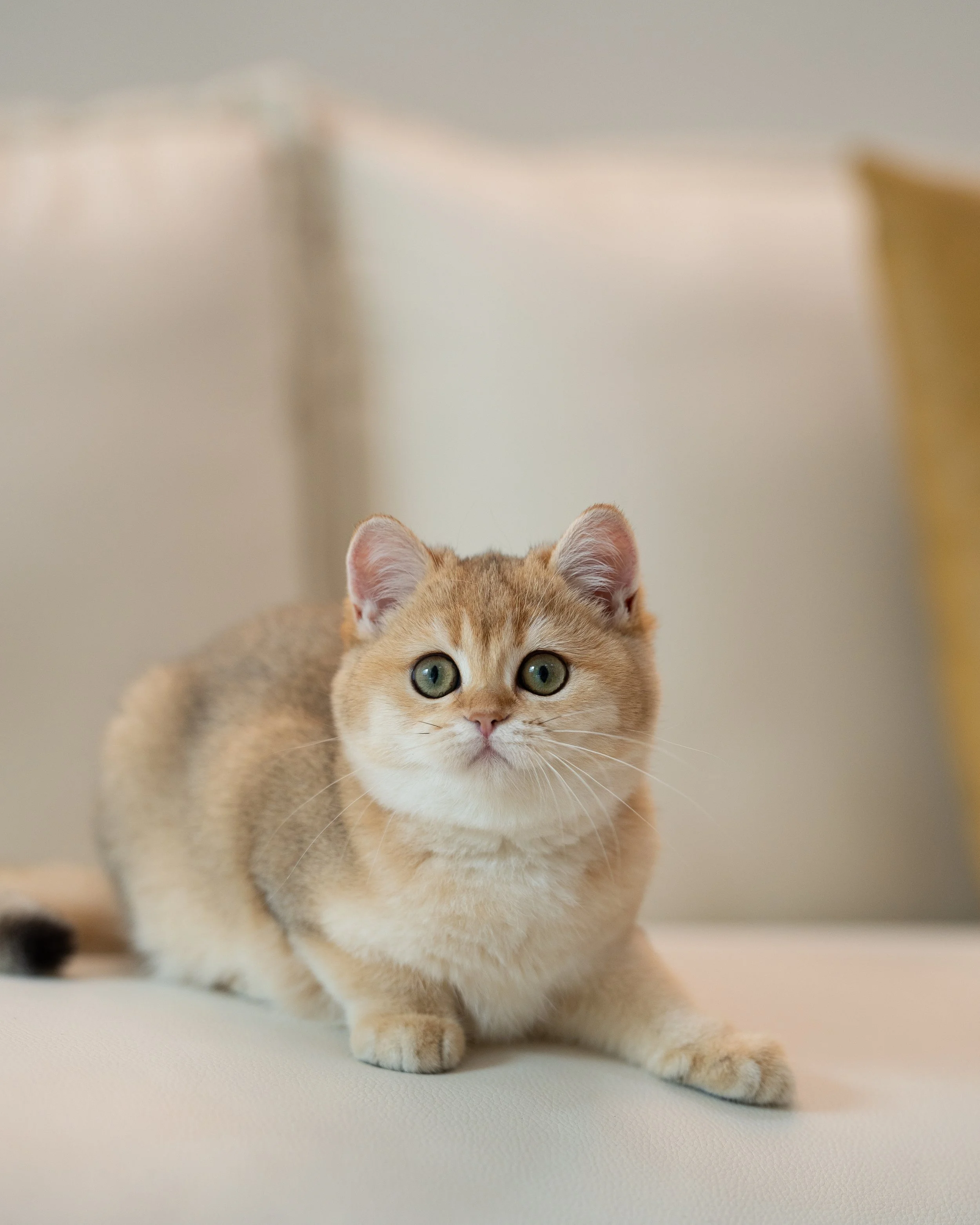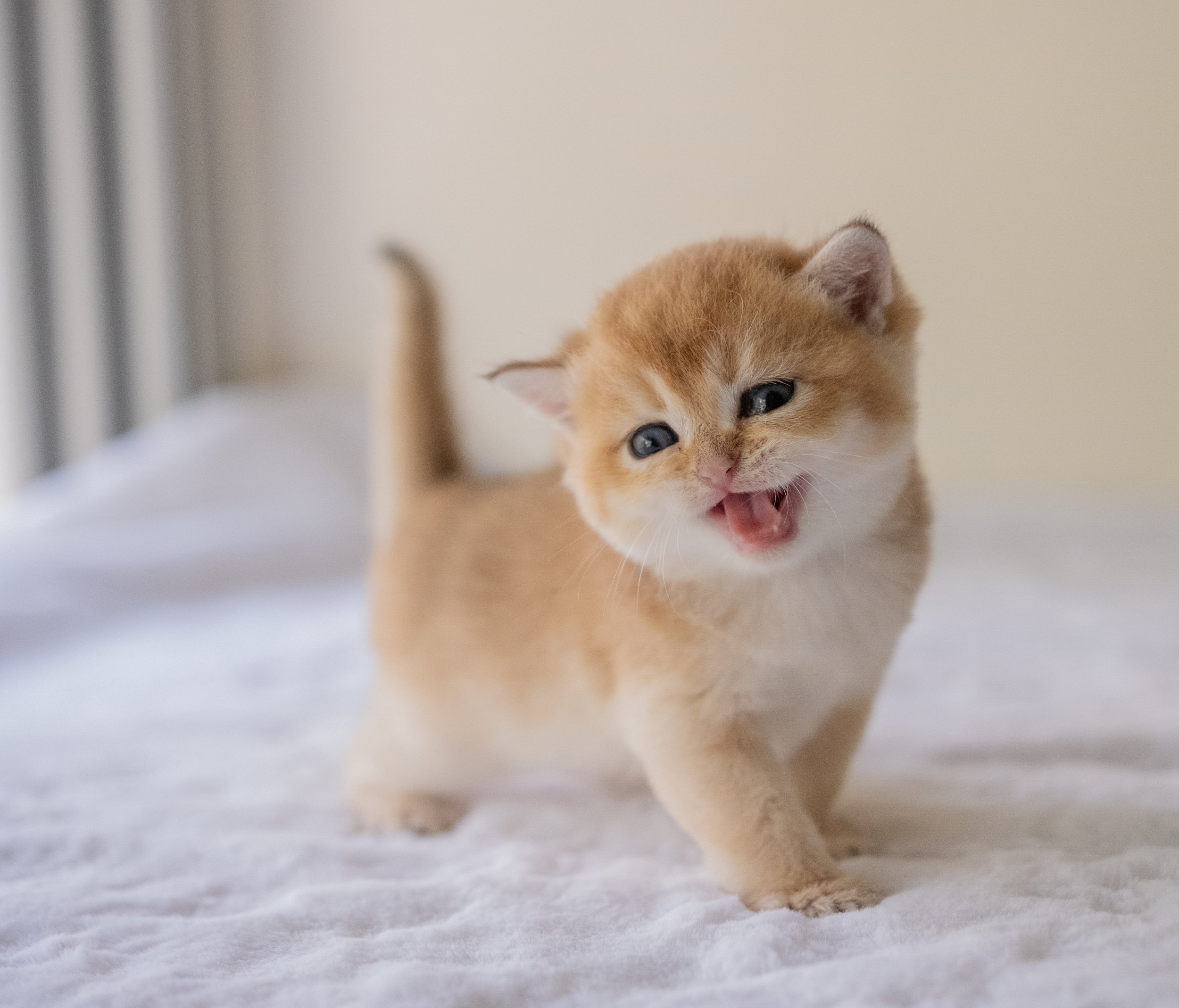
British Shorthair
British Shorthairs are known for their calm, easygoing personalities and signature round teddy bear faces. They’re affectionate without being overly demanding, making them a great choice for first-time cat owners, families, or anyone looking for a quiet and charming companion.
At Fluffydolls, we mainly bring in Golden Shaded British Shorthairs, particularly the highly sought-after NY11 and NY12 coat types.
Our BSH kittens are imported from Europe and raised in home-based environments where they are socialised from a young age. They arrive at our cattery confident, cuddly, and well-adjusted to everyday life.
Health and temperament are our top priorities. All our parent cats are fully DNA tested and cleared of genetic diseases associated with the breed, so you can bring home your kitten with complete peace of mind.
Meet Our Available Kitten(s)
Everything Your Kitten Goes Home With
Every Fluffydolls kitten comes prepared for a smooth, happy transition into your home. From health safeguards to essentials and little comforts, we’ve put together a complete go-home package for all our kittens.
Thinking of Getting a British Shorthair Kitten?
Why British Shorthair?
British Shorthairs are known for their gentle, easygoing temperament and plush, chunky looks. As they mature, they become calm, affectionate companions — playful when they want to be, but mostly content to lounge and observe the world around them.
We mainly bring in the golden variant of the British Shorthair — not just for their stunning coat, but because they tend to be more affectionate and cuddly compared to traditional colours like blue or black. Their sweet, people-oriented nature makes them especially charming to live with.
They’re an independent breed and don’t demand constant attention, making them a great match for busy individuals or families who appreciate a low-maintenance pet. Their sturdy build and strong appetite give them a teddy bear-like presence that many cat lovers adore.
With their chill nature, British Shorthairs are easy to live with and generally adapt well to new environments. They’re not prone to mischief or destruction, and with basic enrichment like a scratching post and cosy spots to nap, they’re more than happy to relax peacefully at home.
Are British Shorthairs Easy to Groom?
Absolutely — British Shorthairs are one of the lowest-maintenance breeds when it comes to grooming. Their short, dense coats don’t mat easily, and a gentle brush two to three times a week is all it takes to keep their fur in great condition and help manage shedding.
Thanks to their coat length, there’s no need for shaving around the sanitary area or paw pads — a big plus for first-time owners. You won’t have to worry about long fur trapping mess or needing extra care, like with long-haired breeds. No daily brushing, no tangled manes — just a quick routine to keep them looking and feeling their best.
Their grooming needs are minimal, and most British Shorthairs enjoy the attention once they get used to it. Combined with a good diet that supports coat health, keeping your BSH well-groomed is simple and stress-free.
Should I Bathe or Shave My British Shorthair?
One of the great things about British Shorthairs is how easy they are to maintain. They’re naturally clean cats that groom themselves regularly, and their short, dense coat doesn’t trap dirt or oil easily. Bathing is rarely necessary — in fact, most BSH owners go months or even years without needing to give a proper bath.
If you do choose to bathe your British Shorthair, once every 2–3 months is more than enough, and only if needed. Always use a gentle, cat-safe shampoo, and try to keep the experience as calm as possible. We don’t recommend sending them to commercial grooming salons unless absolutely necessary — the unfamiliar environment can be very stressful for most cats.
As for shaving, there’s usually no need at all. British Shorthairs don’t have long or high-maintenance coats, so you won’t have to worry about matting or overgrown fur. Unlike long-haired breeds, they don’t require trimming around the sanitary area or paw pads either — another reason they’re so beginner-friendly.
British Shorthairs are truly low-fuss when it comes to grooming, making them a great choice for families or anyone looking for a clean, easygoing companion.
What Should I Feed My British Shorthair?
After years of caring for cats, we’ve tried it all — raw food, home-cooked meals, freeze-dried, kibble, canned food, and supplements. Through it all, we’ve found that the best and most sustainable diet for our British Shorthairs is a balanced mix of kibble and wet food. Wet food can include canned meals, gently cooked options, or raw (only if prepared safely). For most families, high-quality kibble paired with canned food works beautifully.
British Shorthairs have slightly more compact jaw structures compared to other breeds, which means dental care is something to keep an eye on. We recommend adding dental treats or dental-specific kibble to help reduce tartar buildup and keep their teeth clean. In addition, a scoop of probiotic powder daily supports gut health and immunity, while fish oil provides Omega-3s to maintain a glossy coat and reduce shedding. Freeze-dried treats also work well as healthy snacks or meal toppers.
A typical day could look like this: kibble in the morning, a few freeze-dried bites as an afternoon snack, and a hearty serving of wet food in the evening with a splash of added water for hydration. But no two cats are exactly the same — we’ll guide each of our kitten owners based on their kitten’s personality, appetite, and lifestyle.
Why It Matters Where Your British Shorthair Comes From
British Shorthairs are known for their iconic chunky look and plush coat, but when it comes to personality, things can vary a lot. While they’re often described as independent and reserved, that reputation mostly comes from poor breeding and lack of early socialisation. With the right upbringing, British Shorthairs can be gentle, affectionate, and even cuddly companions. That’s why where your kitten comes from matters so much.
At Fluffydolls, we import British Shorthair kittens exclusively from ethical breeders who do things right from the start:
✅ DNA and blood tests for all breeding cats
✅ Limit breeding to protect the mama cat’s well-being
✅ Raise kittens inside their homes, not cages
✅ Ensure early socialisation and daily human interaction
These behind-the-scenes efforts create a big difference in the kind of cat you bring home — one that’s easy to handle, friendly, and enjoys being around people.
Unfortunately, not all kittens are raised this way.
Unethical breeders often overbreed their queens, making them give birth multiple times a year. This overbreeding puts stress on the mothers and compromises the health and development of the kittens. Even though the kittens may still be sold as “British Shorthairs,” what you get is often far from the relaxed, well-adjusted companion you were hoping for.
Poor breeding practices can result in:
❌ Behavioural issues due to lack of handling
❌ Higher chances of genetic or congenital health conditions
❌ Dull coat quality and weaker immune systems
❌ Kittens that are difficult to handle and don’t enjoy affection
We’re not here to scare you — just to give you the information you need to make the right decision. A British Shorthair can be your companion for the next 15 to 18 years. Choosing the right kitten from the right breeder from the start means a smoother, happier journey for everyone involved.
First-time owner tip
It’s completely normal to feel overwhelmed when choosing your first kitten. Just remember — you’re not alone. At Fluffydolls, we work closely with responsible, ethical breeders who prioritise health, temperament, and proper care. We’re here to help you understand what goes on behind the scenes — from health testing to early socialisation — so you can make a confident, informed choice.
Browse our available breeds or book a visit to spend time with them in person. Sometimes, the right one finds you.



